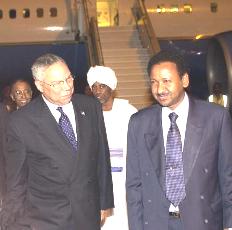Powell visits Darfur after stern warning to Sudan on crisis
KHARTOUM, June 30 (AFP) — US Secretary of State Colin Powell prepared to visit Sudan’s strife-torn western region of Darfur after delivering a stern warning to Khartoum to ease the crisis there or face possible UN sanctions.
 Powell, on the second and final day of a visit here, met tribal and political leaders in the capital before heading to El Fashir, the provincial capital of North Darfur, where he was to see aid workers and visit a camp for people who have been forced from their homes by fighting.
Powell, on the second and final day of a visit here, met tribal and political leaders in the capital before heading to El Fashir, the provincial capital of North Darfur, where he was to see aid workers and visit a camp for people who have been forced from their homes by fighting.
Having extracted pledges from Sudanese officials to ease restrictions on humanitarian access to the region, Powell planned to get a first-hand glimpse of the dire conditions which Khartoum insists have been exaggerated.
Powell met Sudan’s President Omar al-Beshir and Foreign Minister Mustafa Ismail late Tuesday and outlined three main demands: rein in state-sponsored Arab militias accused of massive human rights abuses, open Darfur to relief workers and start talks with the region’s two ethnic minority rebel movements.
“Unless we see more moves soon in all these areas, it may be necessary for the international community to begin considering other actions, to include (UN) Security Council action,” he told reporters after meeting Beshir.
Such action would likely include punitive sanctions on Sudan.
UN chief Kofi Annan is due in Khartoum later Wednesday and he and Powell were to meet to discuss the next steps after the secretary returns to the capital from Darfur.
Powell’s message was backed up by the White House which reaffirmed US President George W. Bush’s concern about the situation and urged the country’s authorities to disarm militias operating there.
“The United States calls upon the Sudanese government to act urgently and decisively to neutralize and disarm the (militias) and to reverse the crisis and create conditions that will allow the displaced to return home safely and with dignity,” spokesman Scott McClellan said.
More than 10,000 people have died in Darfur and more than a million been driven from their homes since the revolt against the Arab-dominated government in Khartoum broke out among the indigenous minorities in February 2003.
Hundreds of thousands of people are at risk from the deteriorating conditions and the militias, known as Janjawid. The United Nations has labelled the situation the world’s worst current humanitarian crisis.
Ismail, who spoke at a joint news conference with Powell, acknowledged difficulties in the region but insisted they were being overblown by aid agencies and the international media.
However, in an apparent bid to soften Powell’s threat, Ismail said Khartoum would soon unveil a series of measures to improve security in Darfur and played up Beshir’s decision to ease restrictions on relief workers and aid supplies.
“We admit there is a problem in Darfur,” Ismail said. “We believe that there is no famine, no epidemic, but that does not mean that there is no humanitarian problem which needs to be taken care of.”
Ahead of Powell’s arrival, Beshir pledged new measures to smooth the flow of aid, but reiterated his position that it was the rebels, more than the militias, who were to blame for the continued deterioration of the situation there despite an April 8 ceasefire signed in neighboring Chad.
“We shall redouble our administrative, technical and security efforts to secure relief access to the needy before the rainfall season,” Beshir said.
Powell, who is carrying satellite photographs showing deserted minority villages that Washington says have been destroyed by the Janjawid, said Beshir appeared to understand the severity of the situation but demurred on offering an assessment of any action Khartoum might take.
“We have got to act now because we are running out of time,” said Powell, referring to the onset of the rainy season in Darfur which will make many aid distribution routes impassable.
Powell is the highest-ranking US official to visit Khartoum since 1978 and he warned that recent improvements in relations between Washington and Khartoum that followed peace agreements between the government and rebels in southern Sudan were jeopardized by the Darfur crisis.
“Unless we resolve the Darfur situation and do it quickly, all that is put at risk,” he said.
